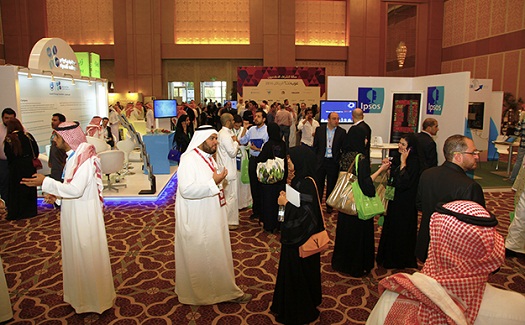What to expect from Arabnet Riyadh 2015


A snapshot of last year's Arabnet Riyadh summit. (Images via Arabnet)
Gearing up for their "largest digital gathering in KSA", with roughly 1,000 tickets sold, and a line up of 80 speakers, ArabNet ‘s 4th edition in Riyadh is looking to be huge.
Excited for this year’s summit ArabNet CEO Omar Christidis told Wamda about the new initiatives they’ll be introducing and what attendees should be looking forward to.
Government participation
It doesn’t sound sexy but the support of government in any startup ecosystem is essential. A first for ArabNet in Saudi, the agenda is going to include a ministerial element.
In 2012, the Kingdom announced its National Strategy for Transformation into Knowledge-based Economy, to be achieved by 2030. With this initiative they would be working to move themselves away from relying on oil.
Several national initiatives have since been launched to implement this vision, amongst them the Saudi National Creative Initiative.
"The ministerial plan for 2030 will definitely be the highlight of the event," said Christidis. "The opening speech will be held by prince Turki bin Saud, and then followed by the ministerial panel discussing the vision of the kingdom to move to a knowledge economy."
The Saudi Minister of Labor and the Minister of Telecommunications will be among the present officials.
Highlights of the discussion will include the Kingdom's initiatives and programs to support SMEs, which constitute the majority of businesses in Saudi. Saudi's unique cultural and organizational challenges that lie ahead of its vision will also be addressed, along with issues like the supply of talents and finances.
Islamic digital economy
Another first for ArabNet Riyadh will be a focus on the challenges and the opportunities for Arab entrepreneurs in the Islamic digital economy, a $107 billion market.
"I think it's fitting to have [this session] in KSA, which is one of the largest Muslim economy markets, along with Turkey," said Christidis.
The sector is of course a huge opportunity. Representing somewhere between 6 to 8 percent of the global digital economy, it still leaves a huge segment of the Muslim population (which represents 23 percent of the global population) unaddressed. “So there's a significant gap, here," Christidis said.
The Islamic digital economy session will dive into the opportunities and challenges that this sector represents, from the media industry to halal foods.
Offering an insight into the opportunities field, Christidis said that KSA could have an advantage in this sector “being [viewed] as a holy place”. An example from Christidis was one idea amongst last year’s startups. Tumoor Al Madina (dates of Madina). Their idea was to sell dates, something culturally important for the region.
Yet the challenges to be highlighted are plenty, one of them being that "largest markets for Islamic digital economy are not actually Arab markets, they are Turkish, or American Muslim communities, or East Asian countries,” said Christidis. This would mean that Arab entrepreneurs willing to venture in this sector would have to consider penetrating foreign markets that are different in ethnicity, culture and the language spoken.
“So really, addressing this economy would mean thinking outside of the box of Arab markets and looking up where Muslims lie across the world."

A panel from 2014.
Matchmaking
The Matchup, a one-on-one meeting between aspiring entrepreneurs and experienced senior executives and leaders, will be part of the Riyadh summit for the first time.
"We feel that, for entrepreneurs, what is missing in KSA is access; access to customers, markets, and opportunities," explained Christidis. "KSA is a challenging market to enter, and [The Matchup] is a unique opportunity for both entrepreneurs and businesses."
Having had success with the session at ArabNet Digital Summit in Dubai earlier this year, where 261 one-on-one meetings were held and 163 investors said they would like to see the startups again, the hopes are high for the session to be a major barrier breaker in Riyadh.

Some of this year's speakers.
Women mentoring women
“Actually, the Riyadh summit has the highest percentage of female attendance among [other summits], because they need the opportunity to [network],” said Christidis.
In response to this observation, ArabNet have added a women-mentoring-women session this year. Saudi women entrepreneurs attending the summit can now expect to attend a private mentoring session with women leaders who will share their experiences with them and offer advice on their career and startups.
“Sometimes it can be challenging for [women] to build the right relationships in a mixed gender contest,” said Christidis. “So we decided to help in female to female context allowing these key relationships to be built.”
Twelve female mentors have so far confirmed their attendance, including investor Leap Venture partner Noor Sweid; managing director at eTree, Esra Assery; Khansa'a Abu Naji, managing director at Meshbak Studio; regional director of Girls in Tech Middle East, Shaima Ghafoor; and Lana Al-Saleh, executive director of Saudi Business incubator.
The conference will take place at The Four Seasons Hotel in Riyadh, on December 14-16.
Would you like to attend ArabNet Riyadh for free? Let us know in the comments! We've only got three codes to give away so don't hesitate!
Update: all three codes have been claimed, however you can still get 20% off your tickets by using the promocode PTR20-lQ4zX3MJze.

